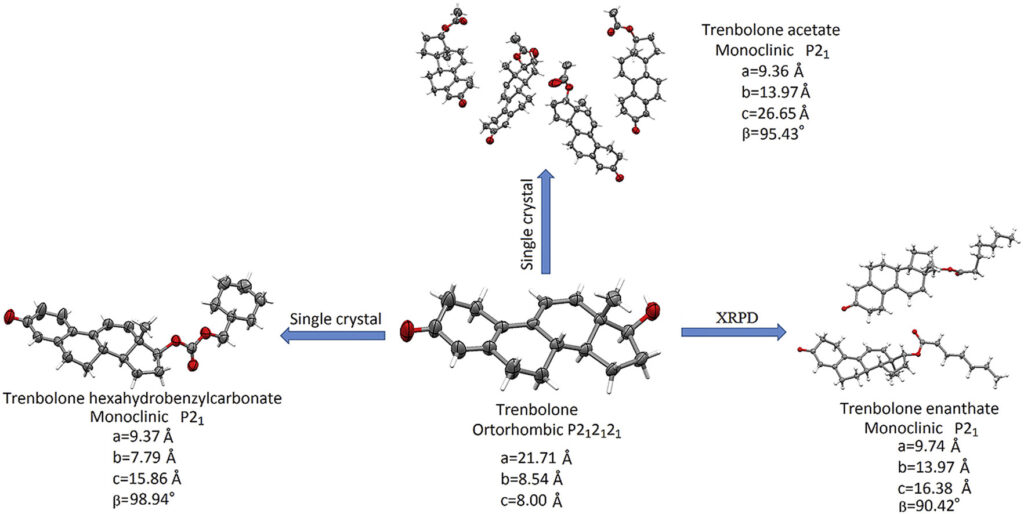Trenbolone, often referred to simply as “Tren,” has earned a reputation as one of the most powerful anabolic steroids used in bodybuilding. Competitive bodybuilders and high-performance athletes widely use it and praise it for its muscle-building potential and the dramatic transformations it enables.
However, behind its potent effects lies a range of serious health risks. Before considering its use, it is essential to understand the physical, psychological, and legal consequences.
What Is Trenbolone?

Trenbolone was originally developed for veterinary use, specifically to stimulate muscle growth and increase appetite in livestock. Most countries have not approved it for human use, yet the bodybuilding community continues to obtain it through underground markets.
There are two primary forms of Trenbolone used in performance enhancement: Trenbolone Acetate and Trenbolone Enanthate. These differ in their release rates and frequency of injection. Bodybuilders often include Tren in bulking or cutting cycles due to its capacity to rapidly increase lean muscle mass and reduce body fat.
Despite its popularity, Trenbolone is not a casual supplement. It is a potent synthetic hormone with significant effects on nearly every system in the body.
How Trenbolone Affects the Body
Trenbolone is a powerful anabolic-androgenic steroid that strongly attaches to androgen receptors in muscle tissue. It boosts protein synthesis and helps retain nitrogen, two key factors in supporting muscle growth. The androgenic nature causes pronounced physical changes, such as increased vascularity and muscle hardness.
Trenbolone does not convert to estrogen like other steroids and so may reduce some estrogen-related side effects, but cause other hormonal imbalances. Unlike many other steroids, it provides fast results.
However, this potency comes at a cost. The body’s systems are quickly overwhelmed, and side effects can appear early in a cycle, intensifying as use continues.
Immediate and Short-Term Side Effects
Trenbolone users frequently report difficulty sleeping, often describing intense night sweats and insomnia. Cardiovascular strain is also common, with elevated heart rates and increased blood pressure observed in many users.
Another well-known phenomenon is “tren rage,” marked by extreme irritability, sudden anger, and emotional instability. Experts attribute these changes to the hormone’s strong androgenic effects on the brain.
Libido fluctuations can range from hypersexuality to complete sexual dysfunction. Mood swings are unpredictable, making daily social and professional interactions more challenging for many individuals.
Long-Term Health Risks
One of the most serious concerns is the long-term suppression of natural testosterone production. Post-cycle, many users experience months of hormonal imbalance, and some may never fully recover normal testosterone levels without medical intervention.
Gynecomastia, or male breast development, can occur even with Trenbolone’s low estrogen conversion. It occurs due to its progestin activity, which can stimulate the growth of breast tissue.
Tren puts serious stress on the liver and kidneys, especially when users stack it with other compounds. Using it long-term can cause irreversible organ damage, particularly if users fail to monitor their health properly. Cardiovascular health is also at risk. Cholesterol levels often worsen dramatically, increasing the chance of heart disease, arterial plaque buildup, and stroke.
The Psychological Impact

Trenbolone’s effect on the brain is profound. Users often report heightened aggression and paranoia, which can spiral into chronic anxiety and depression. Body image disturbances are not uncommon, as individuals become mentally dependent on the physique enhancements they achieve while on cycle.
Once the cycle ends, many experience a sharp decline in motivation, self-esteem, and mental clarity. This psychological crash can lead to ongoing use, dependency, or other harmful behaviors.
Mental health support is rarely considered in steroid culture, making this an often overlooked but critical aspect of Trenbolone use.
The Importance of Post-Cycle Therapy (PCT)
Post-cycle therapy is essential for anyone using Trenbolone. PCT helps restart the body’s natural testosterone production and mitigate some of the side effects associated with hormonal suppression.
Common drugs used in PCT include Clomid (clomiphene citrate) and Nolvadex (tamoxifen citrate). These medications stimulate the brain to signal the testes to resume natural testosterone production.
PCT timing and duration depend on the duration and intensity of the steroid cycle. Without it, users risk prolonged hormonal dysfunction, excess fat gain, muscle loss, and emotional instability.
Legal and Ethical Considerations
Many countries, including the United States, classify Trenbolone as a controlled substance. Its use without a prescription is illegal, and possession can result in criminal charges.
Underground labs, which often lack safety and sterility regulations, produce the majority of the Trenbolone used by bodybuilders. Contaminated or mislabeled products pose serious health risks, including infection and toxicity.
All major sports organizations ban athletes from using Trenbolone. Testing positive for the substance can lead to suspensions, fines, and permanent bans from competition. Ethically, its use raises concerns about fair play and long-term health consequences.
Safer Alternatives to Consider
For those seeking physical enhancement without the severe risks, natural testosterone boosters offer a legal and safer option. These supplements use herbs, minerals, and vitamins to support the body’s hormone production.
Selective Androgen Receptor Modulators (SARMs) are sometimes promoted as a middle ground, though they carry their risks and legal ambiguity. The long-term effects of SARMs are not fully understood, and some may suppress testosterone similarly to steroids.
Ultimately, building muscle through a proper diet, progressive training, and effective recovery remains the most sustainable and low-risk path. While slower, this approach avoids the severe health complications associated with Trenbolone.
Frequently Asked Questions
Is Trenbolone safe to use?
Trenbolone is not considered safe for human use and carries significant physical and psychological risks, including heart damage, hormonal suppression, and mental health issues.
Are there safer alternatives to Trenbolone?
Yes. Natural testosterone boosters and legal supplements can support muscle building with fewer risks. However, they are less potent and require more time to see results.
Do all bodybuilders use Trenbolone?
No. While some competitive bodybuilders use it, many avoid it due to its dangers. Increasing awareness of the risks has led some athletes to pursue drug-free bodybuilding approaches.







